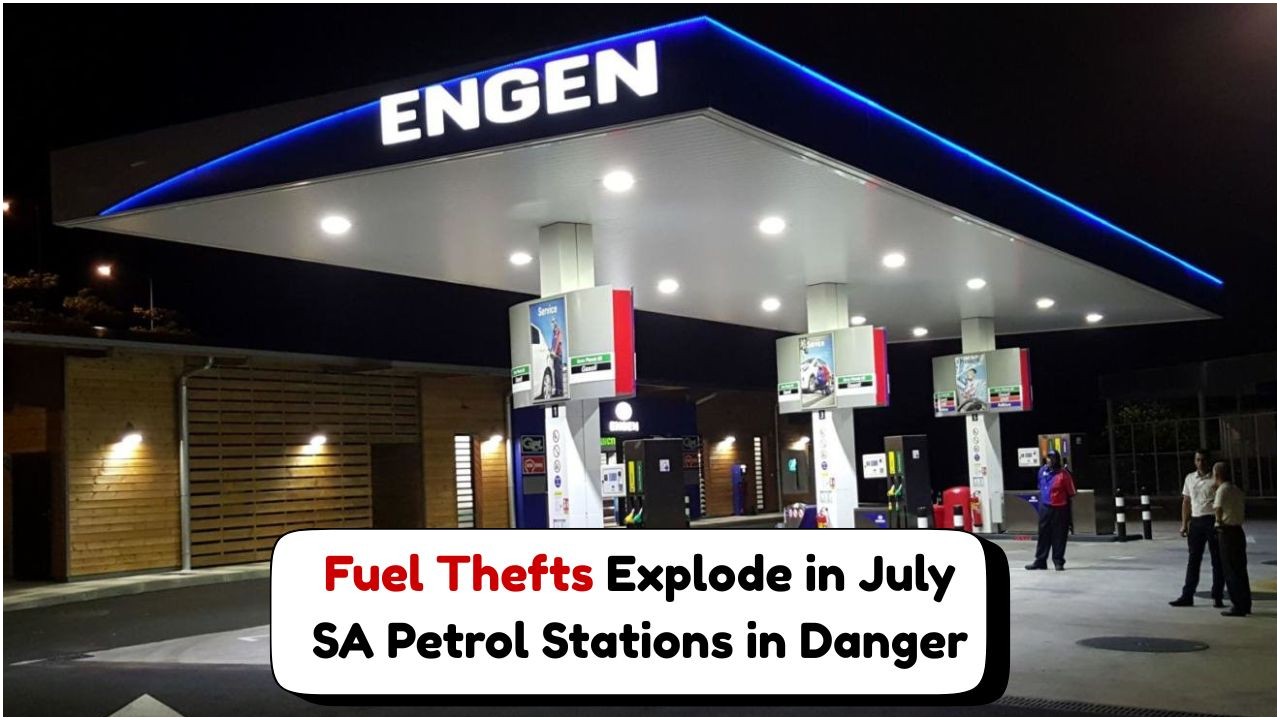Fuel thefts in South Africa: In July, South Africa saw a concerning increase in fuel theft incidents, with over 2,000 reported cases. This surge has raised alarms among citizens and authorities alike, as petrol stations become increasingly targeted by criminals. The rise in fuel thefts is not just a statistic; it reflects broader socio-economic challenges and security issues that the country faces. Petrol stations, once seen as mere refueling stops, are now considered potential crime hotspots, prompting a reevaluation of security measures and community vigilance. This article delves into the factors contributing to this alarming trend, the implications for petrol station owners, and the potential solutions being discussed to combat these crimes.
Reasons Behind the Surge in Fuel Thefts
The dramatic increase in fuel thefts in South Africa during July can be attributed to several factors. Economically, the rising cost of fuel, exacerbated by global market fluctuations and inflation, has made it a lucrative target for thieves. Furthermore, unemployment rates have soared, leading to desperate measures by individuals who see fuel theft as a means to an end. Socially, the lack of adequate policing and community engagement has allowed these crimes to flourish. Petrol stations, often located in less populated areas, present an easy target due to their isolation and the relative ease of access to fuel storage tanks.
| Month | Thefts Reported | Average Fuel Cost (ZAR) |
|---|---|---|
| April | 1,200 | 19.50 |
| May | 1,450 | 20.00 |
| June | 1,800 | 21.00 |
| July | 2,000+ | 22.50 |
Impact on Petrol Stations and Communities
The surge in fuel thefts has had significant repercussions for petrol station operators and the communities they serve. Financially, the loss from stolen fuel translates into millions of rands, affecting the bottom line of businesses already struggling in a competitive market. Moreover, the increased risk of theft has led to higher insurance premiums, further squeezing profit margins. For communities, these crimes erode trust and safety, leading to a heightened sense of vulnerability. Residents may feel compelled to avoid petrol stations at night or in certain areas, affecting local commerce and social cohesion.
- Increased operational costs due to heightened security measures.
- Potential job losses if businesses cannot sustain losses.
- Reduced hours of operation, impacting convenience for consumers.
- Spillover effects on nearby businesses due to perceived area risk.
Strategies to Combat Fuel Theft
Addressing the issue of fuel theft requires a multifaceted approach. Firstly, enhancing security at petrol stations is imperative. This could involve installing advanced surveillance systems, employing security personnel, and utilizing technology like RFID to track fuel distribution. Secondly, community involvement is crucial. Engaging local residents to report suspicious activities and fostering a sense of shared responsibility can deter potential criminals. Thirdly, partnerships between law enforcement agencies and petrol station operators can lead to more effective policing strategies and quicker response times to incidents.
- Implementing high-resolution CCTV systems.
- Training staff on emergency protocols and theft prevention.
- Creating neighborhood watch programs focused on business areas.
- Developing public awareness campaigns on the impacts of fuel theft.
Role of Technology in Preventing Thefts
Technology plays a pivotal role in preventing and addressing fuel thefts. Innovations such as automated fuel dispensers that require secure authentication before access can significantly reduce unauthorized siphoning. Additionally, integrating IoT (Internet of Things) solutions can provide real-time monitoring of fuel levels, alerting operators to discrepancies that may indicate theft. Another promising technological application is the use of blockchain for tracking fuel transactions, ensuring transparency and accountability throughout the supply chain.
- IoT-enabled fuel monitoring systems.
- Blockchain technology for transaction validation.
- Biometric authentication for fuel dispensing.
- Geofencing alerts for unauthorized access attempts.
Security Measures for Petrol Stations
| Measure | Effectiveness | Cost |
|---|---|---|
| CCTV Installation | High | Moderate |
| Security Personnel | Medium | High |
| RFID Tracking | High | Low |
| Community Engagement | Medium | Low |
Community Involvement in Crime Prevention
Engaging communities in crime prevention efforts is a critical step in addressing the surge in fuel thefts. This can be achieved by organizing community meetings where residents and business owners can discuss security concerns and collaborate on solutions. Furthermore, establishing a community alert system can enable rapid sharing of information regarding suspicious activities, enhancing vigilance and prevention efforts. By fostering a sense of collective responsibility, communities can create a deterrent effect, making it more difficult for criminals to operate with impunity.
- Regular community safety meetings.
- Establishment of local business watch groups.
- Use of social media for real-time alert dissemination.
- Collaboration with local law enforcement for joint patrols.
Government’s Role in Addressing Fuel Theft
The government’s involvement is crucial in addressing the systemic issues that contribute to fuel theft. This includes implementing policies that support economic stability and job creation, reducing the motivation for theft. Additionally, government can provide subsidies or incentives for petrol stations to enhance their security measures. Strengthening the judicial system to ensure swift prosecution of offenders can also serve as a deterrent. Lastly, government-led public awareness campaigns can educate citizens on the broader impacts of fuel theft on the economy and society.
- Policy reforms to enhance economic opportunities.
- Subsidies for security technology upgrades.
- Enhanced legal frameworks for prosecuting theft.
- Public education campaigns on crime prevention.
Long-term Solutions for Fuel Theft Reduction
Long-term solutions for reducing fuel theft must focus on sustainable economic and social development. Addressing the root causes, such as poverty and unemployment, can diminish the incentive for theft. Investing in education and vocational training programs can equip individuals with skills needed for gainful employment, reducing reliance on criminal activities. Furthermore, promoting community cohesion through social programs can create environments where crime is less likely to thrive. By focusing on these holistic approaches, South Africa can work towards a future where fuel theft is significantly diminished.
- Comprehensive job training and placement programs.
- Investment in community development projects.
- Long-term economic policy stability.
- Strengthened partnerships between public and private sectors.
FAQ Section
What are the main causes of fuel theft in South Africa?
Fuel theft is primarily driven by economic factors such as unemployment and the high cost of fuel, alongside social issues like inadequate security measures.
How can petrol stations protect against fuel theft?
Petrol stations can enhance security through surveillance systems, security personnel, and community partnerships to monitor and deter criminal activities.
What role does technology play in preventing fuel theft?
Technology such as IoT monitoring, RFID tracking, and blockchain can provide enhanced security and transparency in fuel transactions, reducing theft risks.
How can communities help in reducing fuel theft?
Communities can assist by participating in neighborhood watch programs, reporting suspicious activities, and collaborating with local authorities to improve security measures.
What initiatives can the government undertake to reduce fuel theft?
The government can implement policies that foster economic stability, provide incentives for security enhancements, and run public awareness campaigns on the impacts of fuel theft.







